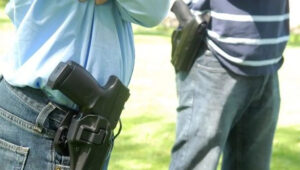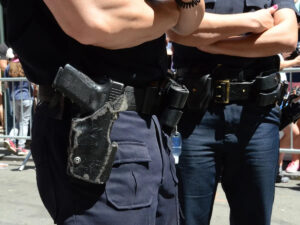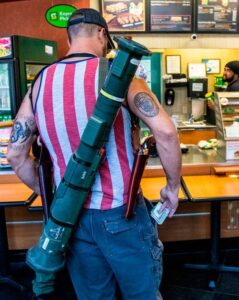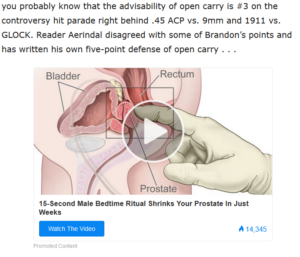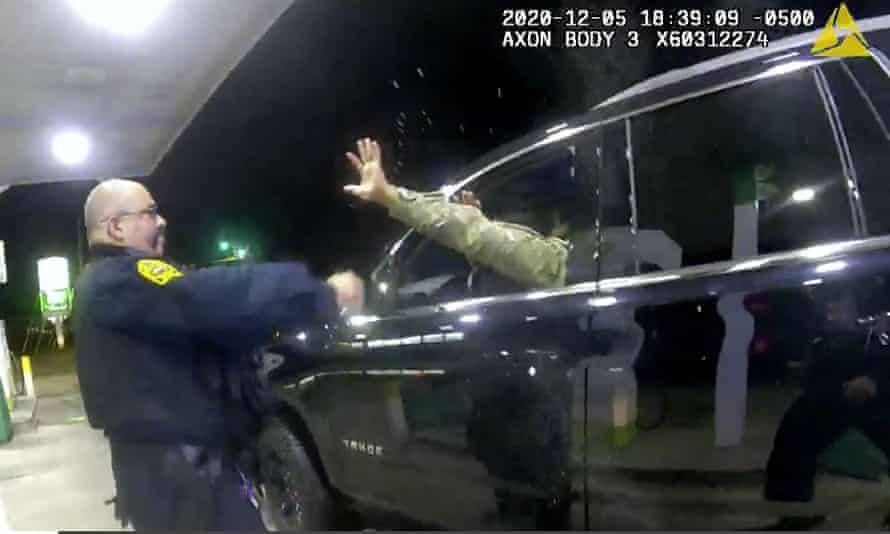
When I was a cop, and I saw that another cop was in the news, I would read the news article with a lot of trepidation. “Oh, geez… what now? It’s hard enough trying to gain the trust of the public, without the fact that every time I turn around, some cop somewhere else is proving the public’s mistrust isn’t unfounded.” And it didn’t help that a lot of the things cops do aren’t very well understood by the public, and a commonplace action gets misinterpreted as something sinister. For example, the practice of raising the hood of your police car if you’re stationary on a hot day and have to leave the car running. There were many times when I’d be blocking a lane of traffic with my car while I worked a vehicle wreck in the middle of a Georgia summer, leaving the car running to power the strobe lights and the AC. If I didn’t raise the hood, the car would start overheating, despite the heavier duty engine cooling that Ford police interceptors had. I saw a picture of this recently, with the caption “Cops raise hoods to block their dash cams, so they won’t get in trouble!”
Sigh.
But…
Maybe…
Just maybe…
The public wouldn’t be so quick to attach nefarious reasons to everything cops do…
If the goddamn cops didn’t keep proving them right.
This past week, we all got to see yet another confirmation that sometimes, the public’s opinion is- and has been for a while- correct. If it seems like there are a lot of cops out there who think they’re part of an occupying army, well… The events that befell Army Lt. Caron Nazario in December in Virginia have once again proven that this assumption is correct.
Lt. Nazario, who is Black and Latino, was driving home from his duty station in a recently purchased vehicle, a black Tahoe with darkly tinted windows. The articles and video I’ve seen show that there isn’t a license plate affixed to the rear; but do state that the tag was visible in the rear window once someone was close enough. And, in fact, this was the reason for the traffic stop that Windsor Virginia police officer Daniel Crocker began on the vehicle. This, in itself, is entirely routine; both the stop, and the tags being inside the car in the back window. I do not know if Virginia issues paper temporary tags to newly purchased cars; but Georgia does, and it was not uncommon to have the temporary tag stolen off of your car- being paper, they are easy to remove- so a lot of people would place the tag in their rear window until their paperwork had reached the tag office for a permanent one.
Officer Crocker calls in the traffic stop and activates his blue lights (the bodycam footage I’ve seen starts shortly after the stop is initiated, but before Nazario pulls over). Nazario continues to drive, at a very slow speed, until he reaches a lighted, public area, where he pulls into a gas station and stops.
Again, none of this so far is unusual. In my time as a mandated officer, I lost count of how many traffic stops like this I made for no tag visible; in a lot of those cases, I would see the tag in the window (usually it fell over) when I approached the car. Then it would just be a quick chat with the driver- “I stopped you because I couldn’t see a license plate, but I now see it in the rear deck. When you get home, maybe put a little piece of tape on it so it doesn’t fall down.” I also stopped hundreds of cars with dark window tint- a violation in Georgia at the time, but I never wrote a ticket for it, not even when working a traffic unit. I never stopped a car on suspicion of illegal window tint; I was never that desperate to write a ticket. And I’ve had many cars continue very slowly to a safe space to pull over, something I appreciated. There were always stories in the news about some guy putting blue lights in his car and pulling people over; not that common but common enough to make people think twice about pulling over for a slick-top car. Mostly, I appreciated it because there’s nothing quite like the pucker you get when a car passes a foot from your ass at 70mph when you’re talking to the driver of the car you just pulled over that isn’t over far enough.
So, by all rights, this would have been a routine traffic stop. (And if you, dear reader, are about to pounce on me over my use of “routine traffic stop”, just hold your water; we’re going to talk about that phrase, and how it’s really at the heart of this issue.)
So, how did this stop go wrong? And when?
It went wrong as soon as the video starts.
The footage is from Officer Joe Guiterez’ body camera, as he follows behind Crocker. Crocker can be heard over the radio calling out the chase, calmly and professionally, noting speeds- 18 mph- and lane position. As would be standard after a vehicle finally stops after a chase, both Officers begin the “Felony Stop” procedure; a method of controlling a situation so all occupants of the car can be removed and secured, one by one, minimizing the risks to the Officers.
Can you see in that paragraph where things went wrong?
It went wrong the moment this stop became a “chase”.
There’s always a moment of tension when you turn on the strobes to pull over a car. Is this guy gonna take off? Is there something I don’t know about the driver that would make him want to run from the cops, when all I want to do is see if he has a tag or not? Did he just rob a bank? Am I about to get in a shootout?
Wow, that sounded kind of… paranoid. More on that later, too.
So, when the car didn’t immediately pull over, sure, there’s going to be some concern. I’d let Dispatch know the car hasn’t pulled over yet, but… 18 miles per hour? He’s not running… And as he started to move over and pull into a well lighted public area, well, I know he’s just looking for a safe spot. I’ve even had drivers call 911 to tell the dispatcher to let the officer know they’re going to a safe spot.
The video I’ve seen doesn’t start right at the beginning of the stop, so I can’t hear what Crocker says when the car doesn’t pull over immediately, but I’m betting the words he used were “vehicle is failing to yield”, which immediately has connotations to anyone hearing it on the radio that there’s about to be chase… Or, “10-80”, which was the formal declaration that this is a chase.
I don’t know what was said. I’m sure more will come out as Nazario’s lawsuit proceeds. But what I did see suggests that these officers already considered it a chase, to be concluded by a felony stop, which is what then happened.
A typical “Felony Stop” involves the police stopping two vehicles side by side behind the suspect vehicle, illuminating it with headlights, takedown lights, spotlights. One officer is the cover, one is the contact. Cover officer only gives the commands to prevent confusion– hands out the window, left hand to reach in and turn off the ignition, then drop the keys outside the window, open door with the outside handle, step out, turn around with hands raised (raises shirt hem above the waistline to see if there’s weapons), back up to the sound of my voice, stop, down on both knees, go prone, arms out like an airplane… contact officer moves to handcuff while cover officer covers the car at gunpoint. All people in the car are removed this way and handcuffed; then the car is searched for other occupants. As its name implies, it’s used when the occupants of the car are expected to be armed and expected to fight the cops if given the chance. It’s a high-risk, armed encounter; and hearing the words “Felony stop” immediately puts everyone into a heightend state of tension.
In other words, they’re not usually done on a misdemeanor traffic stop, even with the flags of the car not stopping immediately and the tint making it very difficult to see inside. I’ve yet to see window tint so dark that a spotlight at the side of the car didn’t illuminate the interior, and two officers can “L” the car if lighting conditions aren’t right.
So, that’s the setup- this minor traffic violation has now turned into a dangerous felony stop.
And here’s where this smoldering dumpster-fire of a traffic stop ignites: When Officer Guiterrez gets his jackboots rustled.
Multiple commands to open the door, open the door and step out, open the door by Crocker, who has assumed the role of cover. I can almost see him thinking “The Book says he should be getting out now, but he’s not… Why isn’t this working?”
Then Guiterrez loses his patience and yells, full throated, “GET OUT OF THE CAR! NOW!”
You can see this startle Crocker. Startles him so much that he shifts his grip on his gun, moving from a perfectly serviceable modified Weaver, though he’s leaning back too much, into a… well, I don’t think there’s a name for it, other than “railroad tracks”… because with his left thumb riding across his right hand, and directly behind the slide of the Glock, if he fires that gun, the slide will cut across his thumb, leaving parallel cuts in the skin– railroad tracks. It’s not something you normally do more than once on the range, because it’s a very painful lesson. Crocker also yells, much more forcefully, “open the door and get out of the car!”
There might have been a chance to salvage this stop before Guiterrez lost his patience. A chance to slow down just a step, figure out what’s really going on, and de-escalate. But once Guiterrez started controlling the scene, Crocker mimicked his actions and escalated as well. Crocker’s actions make me believe he’s more inexperienced than Guiterrez.
Guiterrez now moves to the left of the vehicle, around some gas pumps, using “meh” cover (not really cover, more concealment), and Crocker follows, keeping to the rear. We can now more clearly hear Nazario asking “What’s going on? What’s happening?” as the commands to exit continue. And then Guiterrez shouts the real reason behind his seemingly irrational anger- “You know what, I’m a veteran too! I learned how to OBEY!”
That’s about as close as you can get to “Respect mah AUTHORITAAAAH!” without actually being Eric Cartman.
OK. This will not end well. From the very start, this routine traffic stop was doomed to fail; doomed by the very training that was theoretically designed to prevent injury and violence.
To the officer, that is.
(Side note: There has been a lot of Twitter fury directed at Guiterrez saying “You about to ride the lightning, son!”, but for the wrong reason. It is another indicator of his bull cop tactics and attitude, yes; but most people took it to mean Nazario is about to be executed in an electric chair. It is also a common cop term for someone getting Tasered… and, in fact, Guiterrez holsters his Glock and unholsters his Taser after saying it. Still a clue into Guiterrez’s mindset, but not an indication of immediate execution. Context is important.)
The rest of the video continues as we’d expect- Nazario doesn’t exit until after he’s pepper sprayed repeatedly by Guiterrez, doesn’t get immediately to the ground and is kicked down prone. Nazario doesn’t make any violent or sudden gestures, however, and genuinely seems afraid and confused; especially after being pepper sprayed. Having been pepper sprayed many, many times myself, I can say that this is a completely understandable reaction.
Notable is Crocker attempting to open Nazario’s door after pleading for Nazario to exit- “Sir! Just… get out of the car! Work with us, and we’ll talk with you!” Textbook Academy presentation. He, at least, realizes something’s wrong and is trying, a smidge, to de-escalate. But Guiterrez orders him aside and begins spraying OC.
(Also notable is Guiterrez coughing after spraying Nazario… When you spray OC, it leaves a cloud of vapor and droplets that get on everyone nearby. You can even see it hit the lens of his bodycam. But, instead of the discomfort reminding him that he’s going too far, he probably wore it as a badge of honor.)
I haven’t mentioned possible deeper-rooted reasons for the cop’s reactions; but it can’t be ignored. When I was a cop and someone saw a car with limo tint, their muttered comment was “Probably a gang-banger”. And those dirty, dangerous, elusive “gang-bangers” were, of course, Black or Latino. Did that play a factor in why this became a felony stop? Don’t know, but it can’t be ignored. What also can’t be ignored are the number of POC that have been killed after following police orders to the letter and were still shot. I am a the whitest, most anglo-saxon male you could ever find- my picture is in the dictionary next to the entry for “honky”- but even I know that fact, that danger from the police, is in the back of every POC’s mind when they encounter the police, especially in this manner. So, yes, while this might have been avoided had Nazario just exited the vehicle… it might have ended even more tragically, and Nazario knew that, just by virtue of being a POC today.
I’ve mentioned in this article several times the evidence I’ve seen of Crocker and Guiterrez’ excellent tactical training. A lot of it was textbook, tactically; the same things I taught hundreds of cops in Georgia. But it’s also this training, taught officially and unofficially by the field training officers and senior officers in every department, that truly caused this encounter to end the way it did; and probably caused countless other encounters like this, infamous or unknown. It’s the training that says “there is no such thing as a routine traffic stop”.
I started in Law Enforcement in 1988, a freshman in college, as an auxiliary officer- a glorified Security Guard working for a University Department of Public Safety. I became a police dispatcher in 1991, and, having an interest in firearms as part of some strange but common ideal of manliness, often went to the range with the sworn Officers of the department. It was a Lieutenant, impressed by my marksmanship, who convinced me to go to the Police Academy in 1996 to become a Mandated Officer, with the powers of arrest- a cop. In the Academy, I excelled- Top academic score, Top Gun at the range, and voted Class President (after, though, the first Class President had to quit the Academy after being fired by his department for some scandal). At the Academy Graduation (after 11 weeks of training; a sadly paltry amount), I had to give the Commencement Speech. I was introduced as the Top Gun, Honor Graduate (with an overall academic score of- get this- 94%), and Class President. I spoke nervously about networking with one another post-graduation, to teach each other what we learned on our separate paths, and therefore become better in our profession; and was met with a standing ovation by the class and my instructors.
Afterwards, an older, black, County Commissioner, who was invited to attend the graduation (this was a regional state academy that actually used to be run by my department until the State consolidated Academies), made his speech. He congratulated all of us… and then proceeded to say that it was a shame that the Top Gun score of 99.8% on the handgun qualification was higher than the top academic score of 94%. He said that the study of Law Enforcement, the Profession of Law Enforcement, to fairly and equitably enforce the laws that our society holds as important to civilization, should be more important than the ability to kill another human being accurately.
That caused a jolt in me. I was, after all, the holder of both those achievements; so it felt like an insult to me, personally. Afterwards, when diplomas were handed out and we did our diploma walk, all of the instructors whispered words of encouragement; including “To hell with that guy, you deserve this.”
25 years later, I think on this; and I realize…
The County Commissioner was right. And foresaw where we were headed. He wasn’t insulting me, personally; but rather taking exception with this idea that cops are faced with “combat” every day, guarding the “Thin Blue Line” between Order and Chaos; so much so, that skill with a weapon is more important than knowledge of the law or things like empathy and de-escalation techniques. And it’s this attitude that leads to some police instructor, just like me, using the phrase “There’s no such thing as a ‘routine’ traffic stop!”, that’s a perfect example of the mindset.
Oh, I used that phrase innocently enough as an instructor. I wanted to impress upon my students the fact that you always have to be ready for the unexpected, always in Condition Yellow/Orange while on duty, that you can never let your guard down. That guy you just stopped for a broken tail light- or, maybe, no license plate- Might… Might… have just murdered his girlfriend and stuffed her in his trunk. So you better position the take-downs and your car just right when you stop them, and let Dispatch know. Take a second to watch the driver… is he fidgiting nervously? Reaching under the seat? Shoulders raised, indicating he’s pulling a gun from his waistband? Slowly exit, keeping your eye on his reflection in his side mirror. Stop at the trunk to push down on it to ensure it’s latched; just in case there’s a gunman in there ready to pop up behind you (wait, I thought the dead wife was in the trunk? Never mind.) This would also leave your fingerprints on the trunk, in case they had to identify this car after you were gunned down, in the days before dashcams. Hug the side of the car; shine your flashlight in the back seat to make sure there’s no one hiding there. Stop at the B-pillar of the car, so if the driver tries to shoot you he has to turn all the way around. Get a good whiff of the air inside the car when he rolls his windows down, to sniff for booze or pot smoke (those degenerates). At the end of the stop, sigh heavily; happy that you’ve survived another encounter with a…
Civilian.
And so on, and so on. Yes, every one of those possible scenarios during a traffic stop has happened in the past. These lesson plans were developed on the blood of another officer, another line of duty death… but. Those things, even in the big city, don’t happen that often. Especially not on the University campus, or in the urban counties where I worked. But we taught these horror stories, and the officers ate up this training, throughout my career; and long before then. Buoyed by Starsky and Hutch and Hill Street Blues and Cagny and Lacy and Miami Vice, we believed the danger was constant and omnipresent. When there was a real danger that any agency might have to deal with- Active Shooters- we, as a nation, spent more time learning SWAT-style tactics instead of asking why these kids are shooting up schools and how the hell did they get these guns, anyway?
This kind of training- you must always be alert, must always mis-trust the people you contact; this constant paranoia- may have saved a life or two, but is corrosive on your world-view and your mental health. What are the statistics on cop divorces and rate of alcoholism and suicide after retirement, again? They’re pretty shocking.
There is, also, and always, the question of race. I’ve been faced with that my entire life in the South, and it’s always present in Law Enforcement. When I joined my second agency, a metro-area but still mostly rural Sheriff’s Office, a “sundown” sign had existed until a couple of years before my arrival along a stretch of state highway that passed through an area known, by the sign the crotchety old white guy who lived there put up, as “Struggleville”.
A “Sundown sign”, in Georgia, means a billboard that says “Nigger, don’t let the sun set on you here”.
Yeah. One of the first black deputies to reach the rank of Lieutenant at this Sheriff’s Office used to tell stories about how black deputies didn’t ride through Struggleville alone, lest they be lynched. Memories of the “County-Line Gang”, the Southern Mafia, Buford Pusser’s nemesis in “Walking Tall”, had connections to my county and it’s history.
Once you combine this militarization of Law Enforcement with the also deep-rooted, but subtle, racism inherent not only in the south but all of white society in the US, you get the reason why cries of “Defund the Police” have some merit, even if the messaging isn’t clear. There is a deep, deep rot in Law Enforcement; that seems plausible on the surface- it can be a dangerous profession- but the actual level of danger is far, far less than justifies the current state. It’s the mindset that leads two officers, one of whom has a serious authority complex and another that seems too inexperienced to know better but knows it’s wrong on a deep level, to over-react this badly on a, yes, ROUTINE traffic stop. And this “law and order” ideal is also shaped by the general attitudes of the public towards what they think Law Enforcement is about.
There must be a re-boot of policing. A tear-down and re-birth, based on humanity and compassion… the things those of us that became cops… some of us, anyway… thought Policing was about, even if we found out later it really wasn’t.
And if you’re a cop today… you need to have a real talk with yourself what you thought the profession was, and what it has become… and work to change it.


